O.K. Corral (building)
|
O.K. Corral Tombstone Historic District | |
|
Allen Street frontage | |
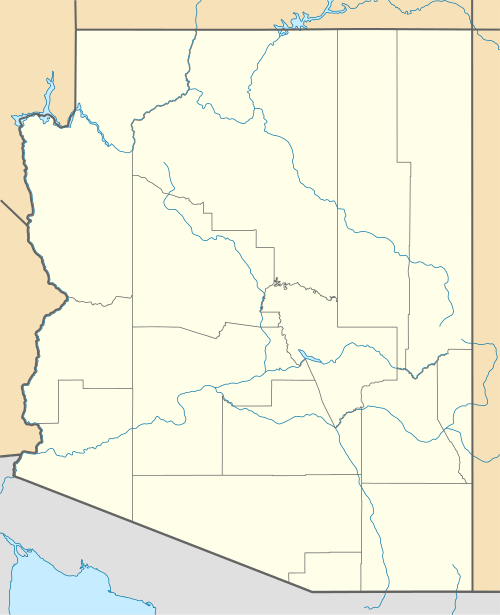  | |
| Location | Tombstone, Arizona |
|---|---|
| Coordinates | 31°42′48.5″N 110°4′8.7″W / 31.713472°N 110.069083°WCoordinates: 31°42′48.5″N 110°4′8.7″W / 31.713472°N 110.069083°W |
| NRHP Reference # | 66000171 |
| Significant dates | |
| Added to NRHP | October 15, 1966[1] |
| Designated NHLD | July 4, 1961[2] |
The O.K. Corral (Old Kindersley[3]) was a livery and horse corral from 1879 to about 1888 in the mining boomtown of Tombstone, Arizona Territory, in the southwestern United States near the border with Mexico.
Despite its famous association with the Gunfight at the O.K. Corral, the historic gunfight did not take place within or next to the corral on Allen Street, but in a narrow lot on Fremont Street, six doors west of the rear entrance to the corral. The lot was between Harwood's home and C. S. Fly's 12-room boarding house and photography studio.[4]
The 1957 film Gunfight at the O.K. Corral made the shootout famous and the public was incorrectly led to believe it was the actual location of the altercation. Despite the historical inaccuracy, the corral is currently marketed and advertised as the location of the shootout, and visitors can pay to see a reenactment of the gunfight. The corral is now part of the Tombstone Historic District.
Origins
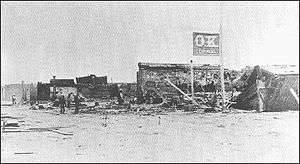
At the time of the gunfight on October 26, 1881, the O.K. Corral and Livery was one of seven liveries and corrals in the city of about 5,300 residents,[5] excluding Chinese and children. The others included the Dexter Livery (owned by John Dunbar and Johnny Behan), Pioneer Livery, Tombstone Livery, West End Corral, P.W. Smith Corral, C.N. Thomas West End Corral, and the Fashion Stables,[6]
The O.K. Corral was owned at the time by “Honest John” Montgomery and Edward Monroe Benson.[7] Most residents of the town did not own a horse; when they needed to go out of town, they rented a horse from one of the liveries or corrals. The corral and livery also cared for transient stock, and provided buggies, carriages, and wagons with teams of horses. As of 1886, they also rented an 11-passenger excursion coach.[8]
The corral and buildings were completely destroyed by a fire that burned almost all of the western business district on May 25, 1882.[9] The rebuilt corral began to gain attention from the American public in 1931, when author Stuart Lake published an initially well-received biography, Wyatt Earp: Frontier Marshal, two years after Earp's death.[10] Published during the Great Depression, the book captured American imaginations. It was also the basis for the 1946 film, My Darling Clementine, by director John Ford.[10] After the film Gunfight at the O.K. Corral was released in 1957, the shootout became known by that name and the corral became wrongly fixed in the public's consciousness as the location of the shoot out.
Location
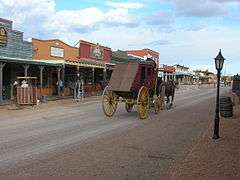
According to testimony after the shootout, the outlaw Cowboys who fought the Earps and Doc Holliday went from Dexter's Livery Stable, where they had left their horses, to Spangenberg's gun shop on Fourth Street.[11]:181:185 Wyatt Earp saw them inside and later said he thought they were filling their cartridge belts with bullets. The Cowboys then walked over to the O.K. Corral where witnesses overheard them threatening to kill the Earps. Citizens reported the threats and the armed Cowboys' movements to Tombstone City Marshal Virgil Earp.
On April 19, 1881, the city had passed ordinance #9 requiring anyone carrying a bowie knife, dirk, pistol or rifle[12][13] to deposit their weapons at a livery or saloon soon after entering town.[14] The ordinance was the legal basis for City Marshall Virgil Earp's decision to confront the Cowboys that resulted in the shoot out.[15]
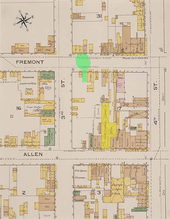
The Earps and Doc Holliday walked west on Fremont Street, looking for the Cowboys. After passing the rear entrance to the O.K. Corral, they found the Cowboys gathered in a narrow 15–20 feet (4.6–6.1 m) wide lot[16] and adjacent to C. S. Fly's 12-room boarding house and photography studio at 312 Fremont Street.[4][17]:4 The gun fight took place within the narrow lot and on Fremont Street.
The O.K. Corral at 326 Allen Street[18] is within the Tombstone Historic District.[19]
Current status
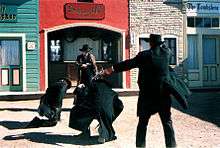
Investors from Detroit, Michigan, led by attorney Harold O. Love, bought the O.K. Corral, along with The Tombstone Epitaph, the Crystal Palace Hotel, and Schieffelin Hall in 1964.[20] The corral in Tombstone today is inaccurately advertised and marketed as the location of the actual gunfight.[21] Its association with the legendary gunfight attracts many visitors to the city. They can pay to view a reenactment of the gunfight three times daily on the site of the historic corral.[21] The lot in which most of the gun fight actually occurred is now maintained as part of a living history museum. Fremont Street, currently Arizona Highway 80, where portions of the gunfight actually took place, is open to the public.
In 2004, the town's focus on tourism led the National Park Service (NPS) to threaten to remove its designation as a National Historic Landmark District, a status it earned in 1961 as "one of the best preserved specimens of the rugged frontier town of the 1870s and '80s." Since this time, however, the community has worked closely with the NPS to develop and implement a new more appropriate stewardship program.
Historical significance
Although the historical corral wasn't the actual site of the famous gunfight, its association with the legendary gunfight largely contributed to the creation of the historic district and its placement on the National Register.[22] Another O.K. Corral is known to have existed in Globe, Arizona Territory. The O.K. Corral and Feed Stable was opened before November 8, 1879.[8]
External links
References
- ↑ National Park Service (2007-01-23). "National Register Information System". National Register of Historic Places. National Park Service.
- ↑ "Tombstone Historic District". National Historic Landmark summary listing. National Park Service. Retrieved 2007-09-27.
- ↑ Bell, Bob Bose (2006) True West Magazine
- 1 2 Ziegler, Jack (May 5, 2000). "C.S. Fly: Frontier Photographer". Benson News-Sun. Retrieved 27 August 2014.
- ↑ "882 Census Index of Tombstone Arizona Territory". Archived from the original on April 10, 2013. Retrieved 25 September 2014.
- ↑ "Map of Tombsone". Sanborn Fire Insurance. Retrieved 24 September 2014.
- ↑ Traywick, Ben. "Wyatt Earp's Thirteen Dead Men". The Tombstone News. Retrieved 24 September 2014.
- 1 2 Rose, John. "The O.K. Corral". Wyatt Earp Explorers. Retrieved 24 September 2014.
- ↑ "After the May 25, 1882 fire in Tombstone". Fern Canyon Press. Archived from the original on June 16, 2008. Retrieved 24 October 2014.
- 1 2 Goodman, Michael (July 30, 2005). Wyatt Earp. p. 95. ISBN 1583413391.
- ↑ Weir, William (2009). History's Greatest Lies: the Startling Truths Behind World Events our History Books Got Wrong. Beverly, MA: Fair Winds Press. p. 288. ISBN 1-59233-336-2.
- ↑ "The Law in Tombstone". Retrieved 8 March 2014.
- ↑ Johnson, Paul Lee (July 30, 2012). The McLaurys in Tombstone, Arizona: An O. K. Corral Obituary (First ed.). Denton, Texas: University of North Texas Press. p. 26. ISBN 978-1574414509.
- ↑ "Gunfight at the O.K. Corral: Did Tom McLaury Have a Gun". September 05, 2006. Retrieved 7 February 2011.
- ↑ Douglas Linder (2005). "Ordinances Enforced by the Earps in the OK Corral Shoot-out". Famous Trials: The O. K. Corral Trial. Retrieved 6 February 2011.
- ↑ Tefertiller, Casey; Morey, Jeff. "O.K. Corral: A Gunfight Shrouded in Mystery". HistoryNet.com. Retrieved 27 August 2014.
- ↑ Lubet, Steven (2004). Murder in Tombstone: the Forgotten Trial of Wyatt Earp. New Haven, CT: Yale University Press. p. 288. ISBN 978-0-300-11527-7. Retrieved 14 April 2011.
- ↑ Google place page
- ↑ "US Gazetteer files: 2010, 2000, and 1990". United States Census Bureau. 2011-02-12. Retrieved 2011-04-23.
- ↑ Eppinga, Jane (2009). Around Tombstone: Ghost Towns and Gunfights. Charleston, SC: Arcadia Pub. p. 74. ISBN 978-0738571270.
- 1 2 "O.K. Corral Famous Gunfight Site, Tombstone AZ".
- ↑ Bell, Bob Bose. True West magazine.
